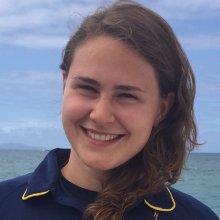
Onni Irish
Tell us about your work/ research. What kinds of things do you do?
I am finishing up my Master of Science Degree in Ocean Mapping at the University of New Hampshire. Ocean Mapping is a growing field because less 10% of the seafloor has been mapped. This is one of the most exciting reasons to join the E/V Nautilus again because it is leading the charge in mapping unexplored waters. My graduate research deals with the United Nations Convention on the Law of the Sea (UNCLOS). Specifically, I am focusing on the most seaward of all maritime zones a coastal State has rights to, which is called the extended continental shelf (ECS). For a coastal State to delineate this maritime zone, it must fulfill certain criteria defined within UNCLOS. For example, the coastal State must define the shape of the seafloor and understand the sub-seafloor's sediment thickness. Seafloor mapping data, which is called bathymetry, is an important part of defining the ECS maritime zone.
What sparked your initial interest in your career?
The initial spark for my love of water, both salt and sweet, was my upbringing by the lakes of northern New England and the Atlantic Ocean where I explored (and played in) the fresh and salt-water environments around me. From the time I could crawl, I was also trying to swim! It was no surprise then that I studied freshwater scarcity as an undergraduate, looking at the dynamic relationship between socioeconomic development, climate change, and freshwater resources. My senior year I took an Ocean Science class and fell in love with it. I bridged the water cycle and have dove into the marine/ocean sciences since then.
Who influenced you or encouraged you the most?
My parents have always encouraged me to follow my passions and explore the world. I am grateful for their support.
What element of your work / study do you think is the most fascinating?
Last summer, on the E/V Nautilus' transit from the Galapagos Islands to San Diego, we mapped a seafloor high that had never been mapped before. It was a privilege to witness this feature being discovered before our eyes and a great reminder that we know so little about the world's oceans.
What other jobs led you to your current career?
I've had many opportunities that have shaped my young career path. Some of those opportunities confirmed my passion for ocean science, whereas others confirmed that there were things I did not want to do in my career. I think the mix of both allowed me to learn about myself--what types of research do I love most? what type of environments do I work best in? what role do I play in a team setting? I've had a number of jobs and internships since I was teenager (Lake Host checking boats for invasive species, State Department Intern, Field Research Assistant, International Energy Researcher, and Analyst for a Consulting Firm) and each of these experiences allowed me to develop further as a professional. Through each of these jobs, whether they were related to science or not, I developed my writing, communication, and technology skills. These skills are just as important as knowing the science, because without them you cannot communicate your work to the public.
What are your degrees and certifications?
Bachelor of Science in Foreign Service--School of Foreign Service, Georgetown University 2012; Master of Science in Ocean Mapping-- University of New Hampshire 2016.
What are your hobbies?
I am an avid hiker and adore waterskiing in the summertime. I also enjoy a good competitive game of basketball and/or beach volleyball too!
What advise would you give someone who wants to have a career like yours?
If you want to get into the ocean sciences, and/or ocean mapping, in particular, I would suggest taking as many science courses as you can to build that scientific foundation. At the same time, it is important for a scientist to remember and communicate to people why his/her research is important to the community (whether that community is the United States as whole or a small coastal town dealing with sea level rise). So, I would recommend taking environmental policy classes and pursuing other non-academic opportunities that would allow you to develop a skill set in communication. I would also push students to take advantage of any opportunities that lay before them. Even if a research opportunity is unrelated to ocean science, but gives you experience in the field and with data collection, you are building a skill set that is critical to the field you do want to pursue. So take advantage of it and have fun!
How did you get involved with the Nautilus Exploration Program? How did you get on the ship?
I applied for the Ocean Science/Mapping Intern position last year after learning about it from my advisor at the Center for Coastal & Ocean Mapping.
"Within the realm of my graduate work (UN Law of the Sea), it became extremely apparent to me that the oceans were the last frontier here on earth, especially in terms of claiming territory. Yet our oceans are so little understood (and mapped). This is the driving reason I am excited to sail aboard the Nautilus."
Expeditions
Onni participated in the following Ocean Exploration Trust expeditions:
